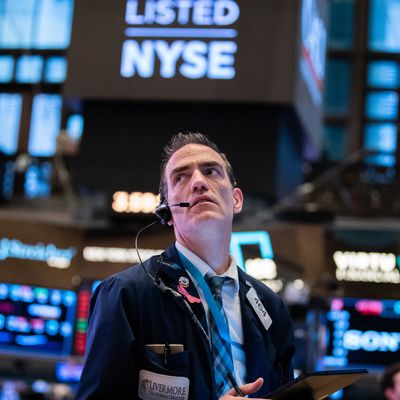
The rally in GameStop either can’t stop or won’t stop (as of this writing at least).
On Thursday, the meteoric rise in the price of the video-game retailer’s shares finally crested, after Robinhood and other apps favored by day traders forbade their users from buying stock in GameStop, AMC Entertainment, and other firms favored by Reddit’s WallStreetBets message board. In a statement, Robinhood insinuated that this move was motivated by a paternalistic concern for keeping its customers “informed” amid the market’s “volatility.” But subsequent reporting suggests that the firm’s true motive was both less selfless and more coherent: Faced with extraordinary levels of trading, Robinhood was running low on the cash necessary to pay its customers when they sold shares and post the collateral demanded by its clearing facility.
But by Thursday’s end, Robinhood had secured a fresh $1 billion in credit from investors and restored its users’ God-given right to buy into (what is almost certainly) the peak of a massive bubble. As a result, GameStop (GME) was up 75 percent as of late Friday morning, making a share in the firm — which specializes in the sale of video-game discs and cartridges at brick-and-mortar stores, in an era when gamers typically download such entertainment directly to their consoles — roughly $62 more valuable than a share in Goldman Sachs, according to the collective intelligence of rational market participants. Meanwhile, the Dow Jones fell by 400 points, as the speculative retail trading unnerved investors. Specifically, some fear that if the GameStop rally continues, hedge funds who’ve held onto or newly adopted short positions in the company will be forced to sell investments in other equities to raise cash, thereby creating downward pressure on overall share prices.
The rally’s revival was aided by novel endorsements from social-media personalities with large followings. Meanwhile, new insights into the rally’s origins surfaced, as two of the internet’s earliest and most influential GameStop bulls — the YouTube streamer Roaring Kitty and Reddit user DeepFuckingValue — were revealed to be the same person: Keith Patrick Gill, a 34-year-old financial adviser who’d recently worked for the insurance company MassMutual. As CNBC reports:
Through frequent posts on Reddit’s WallStreetBets thread, Gill became the Pied Piper of GameStop, sharing screenshots of his portfolio which appeared to inspire thousands of amateur retail investors to follow him into the ailing retailer too.
He began sharing his bets with the group in September 2019, posting a portfolio screenshot indicating he had invested $53,000 in the company and had already netted a $46,000 profit. Reuters was unable to confirm this.
In YouTube videos, he expanded upon his investment thesis, arguing the company was undervalued, and was well-positioned to rapidly grow its fledgling online business.
Earlier this week, Gill claimed to have earned a 4,000 percent return on his GameStop investments, a not-implausible figure, given how early he was to the party. According to screenshots he posted to Reddit, he declined to cash out his gains Wednesday, when they were worth nearly $48 million, and proceeded to see his holdings lose $14.8 million in value over the course of Thursday. By sharing this ostensible proof of his persistent faith that GameStop remains undervalued, Gill appeared to inspire other redditors to hold onto their GME stock, potentially at great personal financial risk.
Gill’s role in fueling the GameStop rally complicates the “David versus Goliath” narrative that has dominated much coverage of this peculiar phenomenon. Although the chartered financial adviser is based in Massachusetts, not on Wall Street, he is a credentialed industry professional, not a Reddit-obsessed autodidact. And his success at taking money from multibillion-dollar hedge funds was built on roping less savvy investors into an exceedingly high-risk play that makes little sense for anyone who cannot afford to lose everything they wager. It was already widely assumed that major Wall Street players piggybacked on the redditors’ short squeeze once they saw which way the capital was flowing. Now it looks like a certified member of the financial industry played a major part in originating that flow. Many ordinary people earned much-needed passive income by joining GameStock on its way up then cashing out at a prudent time; but it is likely that an even larger number of naïve day traders will lose their savings when GME comes back down to earth. To the extent that the “David” in this battle was an assortment of financial advisers and junior Wall Street executives who found a way to slingshot thousands of social-media addicts at the Goliath of Melvin Capital — leaving many working people poorer, and various Wall Street firms richer — it is not clear that opponents of economic inequality have any rooting interest in this fight.






























